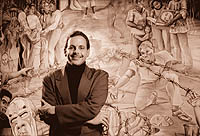
February 7, 2000
Economist Manuel Pastor teams up with San Jose labor group to study the 'new economy'
By Jennifer McNulty
For many workers, the volatility of the "new economy" means less job security, shortened
career paths, and lower wages. To see how workers are faring, UCSC economist Manuel
Pastor is collaborating on a new project with Working Partnerships USA to assess
the career-building services offered by organizations such as temporary employment
agencies, labor unions, community colleges, and community-based organizations.
 |
| Manuel Pastor Photo: r. r. jones |
The answer, increasingly, is what economists call "labor intermediaries," such as for-profit employment agencies, educational institutions, and local initiatives like training centers. These organizations are left trying to fill the gap in services experienced by many workers in today's less-stable employment environment.
But how widespread are these new labor intermediaries, and how good a job are they doing? Do workers know about these options? Do disadvantaged workers, those with the fewest skills and lowest pay, benefit?
To answer these questions and others, Pastor is teaming up with San Jose-based Working Partnerships USA, a labor-supported think tank that conducts research on the changing economy and develops strategies to improve people's working conditions.
"Working Partnerships represents a cutting-edge progressive response to the challenges of inequality and insecurity faced by many workers in Silicon Valley," said Pastor. "It is connected with what may be one of the most dynamic and forward-looking labor councils in the country."
Because the organization "takes both research and policy seriously, it has been able to assemble a first-rate research team that is capable of producing results that will be of use to those promoting the interests of working people in Silicon Valley," said Pastor.
The two-year study, which got under way last month, will examine labor intermediaries in Silicon Valley, considered by many the heart of the "new economy," and metropolitan Milwaukee, a rust-belt area that reflects the "old" economy of manufacturing.
"No one has ever looked at the effects of labor intermediaries," said John Leopold, associate director of Working Partnerships USA. "Given the volatility of the new economy, we know workers are using intermediaries more than ever. We want to see what's out there and how they're doing, in both the 'new' and 'old' economy. We want to identify the organizations that do the best job of helping workers find good jobs that pay well and offer opportunities for advancement, particularly to disadvantaged workers."
Pastor, a professor of Latin American and Latino studies, is an economic development specialist who was selected for the project because of his strong background in community development, said Leopold.
Pastor has been an outspoken advocate for the Latino residents of Los Angeles, where he was a central participant in postriot recovery efforts. His report, "Latinos and the Los Angeles Uprising: The Economic Context," offered an analysis of the underlying socioeconomic challenges facing Latinos in L.A. and contributed to the emergence of a common policy agenda.
Another project--a study of the distribution of toxics storage facilities that
uncovered systematic environmental racism in Los Angeles--prompted the city council
to establish an environmental justice task force after the findings appeared in the
Los Angeles Times.
"Professor Pastor brings both excellent credentials and a commitment to social
change to the job," said Leopold. Pastor will oversee the methodology of the
study, including the design and administration of the survey, data processing, and
writing of results.
The first step of the new project involves profiling organizations within four broad
categories: temporary agencies, unions, community colleges, and community-based organizations.
The second phase entails surveying workers to gauge the effectiveness of each intermediary.
Results will be used to shape policy recommendations, said Leopold.
Established in 1995, Working Partnerships USA is a nonprofit organization dedicated
to the development of employment policies that benefit working families. This study,
which is being funded by grants from the Russell Sage Foundation and the Rockefeller
Foundation, is an example of the innovative research Working Partnerships USA is
pursuing in an effort to develop systemic reforms that will relieve the economic
problems confronting working families. Contributing to the transformation of the
workplace are intensified global competition, new information technology, and corporate
restructuring, said Leopold.
"The rise in temporary employment is resulting in lower wages and benefits and
more job insecurity for everyone," said Leopold, noting that only a minority
of the most highly skilled individuals find that these flexible employment patterns
make it easier to balance work and family responsibilities.
"The majority of Silicon Valley residents are now very vulnerable to rapid economic
changes, they have little access to benefits and health care, and their opportunities
for advancement are limited," said Leopold. "Twenty years ago, temporary
agencies played a very small role, but now Manpower is the largest employer in the
country."
Among the public-policy reforms Working Partnerships USA is advocating are:
- Decrease the disparity in wages between permanent and contingent workers by passing
civil rights legislation to ensure that contingent workers are paid the same wages
as permanent workers who perform the same work;
- Increase access to health coverage, ideally through a system in which people
have access to health coverage by virtue of being residents, not through their employment;
- Increase access to pensions through various tax strategies to promote pension
portability, and adopt measures that allow workers to carry pension credits with
them from job to job;
- Increase access to unemployment insurance. In many states, benefits are denied to independent contractors, temporary, part-time, and seasonal workers.